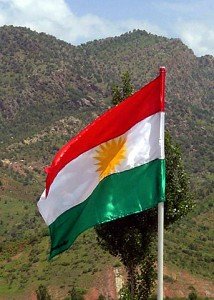Mona Sukkarieh.
The Kurdish Regional Government begun exporting crude oil by truck to Turkey earlier this month (07/2012) in a move that infuriated Baghdad, which claims exclusive rights for exporting energy. In May 2012, Turkey and the Kurdish Regional Government, without the approval of Iraqi authorities, announced a project to build pipelines carrying oil and gas from the semi-autonomous region into Turkey, expected to be completed by 2013 and 2014, increasing the chances for Kurdistan to sell its crude.
Such deals represent a stark contrast with Turkish policies for much of the past decade and Ankara’s at times paranoid determination to contain Kurdish political ambitions. Flash forward, and the current state of affairs between Turkey and the northern province of Kurdistan would seem startling: While maintaining its official position of supporting Iraq’s territorial integrity, Turkey’s relations with Baghdad are deteriorating following what it perceives as sectarian policies by the government of Nouri al-Maliki and his alienation of the Sunni community. On the other hand, and in contrast with its past approach of dealing only with the Iraqi central authorities, Turkey is stepping up its ties with the Kurdish Regional Government. The region accounts for roughly 70% of Turkey’s exports to Iraq, one of its biggest markets abroad. Bilateral trade stood at 7 billion USD in 2011 and will likely triple in the next 5 years. Turkish firms are carrying out vast construction work and are expected to benefit greatly from ambitious reconstruction projects announced by the KRG, including vital transport infrastructure. Turkish energy companies such as Genel Enerjy are also heavily involved in developing oil and gas fields in Iraqi Kurdistan. With its large oil and gas resources, which the Kurdish Regional Government is struggling to export due to ongoing disputes with Baghdad, the region is also an opportunity for Turkey to diversify its energy supplies and alleviate budget pressure.
Indeed, half of the Turkish current account deficit results from energy expenses and given that Turkey buys gas from Iran – its second biggest provider after Russia – at above market price, the country is prospecting for alternative sources of gas and Iraqi Kurdistan seems like an excellent candidate.

Ankara is starting to perceive Iraqi Kurdistan more as an economic partner than a hostile backyard for para-military activities threatening Turkey’s security. By developing links with Iraqi Kurds, Ankara is seeking a double objective: to marginalize radical Kurdish militants at home and to secure its share of the vast economic potential that Iraqi Kurdistan offers. For Iraqi Kurds on the other hand, and amid growing tension with Baghdad over a number of issues, a close economic and energetic cooperation with Turkey is an opportunity to reinforce their autonomy vis-à-vis the central government and to push for greater control over their natural resources. Collaboration between the KRG and Turkey is also likely to reassure western oil companies. Laying down the infrastructure needed to export crude through Turkey to the world markets would make Iraqi Kurdistan even more attractive to western companies, particularly European companies, as Europe seeks to diversify its gas supplies and to find a cheaper alternative to Russian gas. Baghdad might find it even harder to prevent foreign companies from operating in Kurdistan, which, also happens to offer more attractive contract terms by proposing production sharing agreements instead of the service contracts proposed by Baghdad. Earlier this year, Total had already expressed interest in exploiting the semi-autonomous region’s hydrocarbon resources. Interestingly, if Kurdistan were to become an important hydrocarbon supplier, importing countries would find additional interest in securing its stability.
While it is too soon to conclude that the rapprochement between Ankara and Erbil is standing on solid ground (possible setbacks include KRG’s continuous refusal to take action against Turkish Kurdish militants based in its territories and, neighboring countries’ tendencies to exploit certain Kurdish factions against regional rivals – which raises the question of pipelines’ security) one fact remains certain: Iraqi Kurdistan is increasingly being pulled into the Turkish economic sphere. At the political level, the growing distance between Erbil and Baghdad is also being met with warmer relations between Erbil and Ankara. Long-term consequences on Iraq’s unity remain unclear. While the long-sought and often repressed dream of establishing an independent state seems beyond reach at the moment given the regional context and short-term economic obstacles – the issue is not even on Kurdish leaders’ agenda – further autonomy, translated in a more direct management of their affairs, particularly greater control over their resources, represents a good alternative for Iraqi Kurds.
